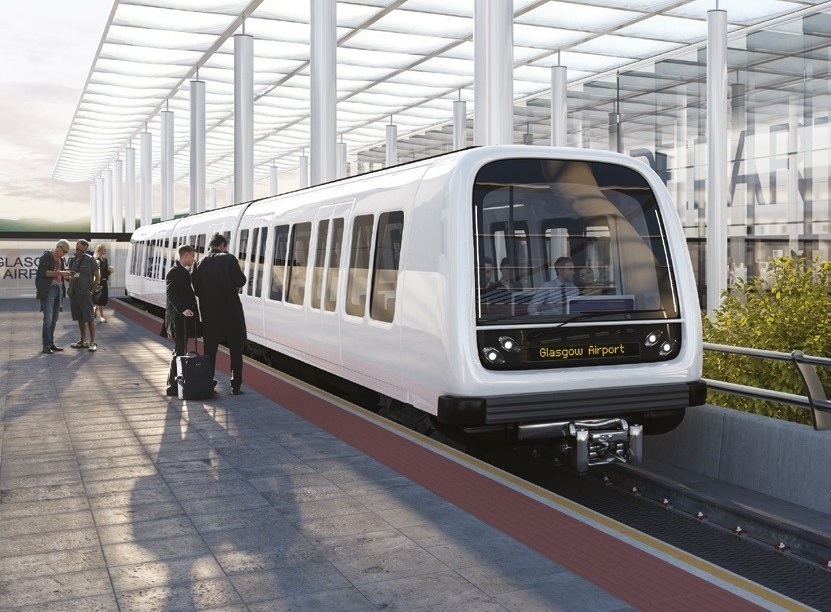Scottish Government publishes blueprint for future transport investment
Mass transit schemes for Scotland’s three biggest cities and plans to connect the nation’s islands with tunnels are among flagship transport plans primed for Scottish Government investment, a new document has revealed.

Indicative designs for Clyde Metro
The second Strategic Transport Projects Review (STPR2) makes 45 recommendations under six key themes which seek to make transport in Scotland more sustainable and support people to make better, more informed choices on how they travel.
When implemented, the government said the changes and measures will play a key role in helping to make the country fairer and greener - by tackling tackle climate change, reducing inequalities and improving health and wellbeing.
The recommendations include:
- Mass transit in the city regions of Glasgow, Edinburgh and Aberdeen: Clyde Metro represents a multi-billion investment which, when complete, could better connect over 1.5 million people to employment, education and health services in and around the Glasgow city region. Plans for Edinburgh & South East Scotland Mass Transit and Aberdeen Rapid Transit will also be developed.
- Rural transport and island communities: Continuing investment in ferry renewals, improving port infrastructure and connections from ferry terminals to other types of public transport to reduce car reliance, enhancing island connectivity and making safety improvements on rural trunk roads where accident rates and severities are typically higher.
- Decarbonisation of public transport: Transport is Scotland’s biggest carbon emitter and the recommendations emphasise decarbonisation and behaviour change for ferries, rail and buses as well as increasing the shift to zero emission vehicles.
- Improving active travel infrastructure: encouraging more people to walk, wheel and cycle more often; cutting carbon emissions and improving health and wellbeing, particularly of children, while supporting sustainable economic growth.
- Transforming freight: developing a net zero freight and logistics network for Scotland that would encourage the switch from road to rail or water and reduce the overall distance travelled, including a review of rail freight terminals/ hubs.
Cabinet secretary for net zero, energy and transport, Michael Matheson said these investments will help reduce overall demand for private vehicles; improve accessibility to employment, education, healthcare and leisure amenities; and strengthen strategic transport connections to, from and within rural areas, as well as across the UK.
Mr Matheson said: “The investment decisions we make now have never been more important. A green recovery from COVID-19 will set us on a path to delivering a fair and just transition to Net Zero. The pandemic has led to fundamental shifts in travel behaviours and we want to ensure that people continue to make sustainable travel choices, that they return to public transport and our economic recovery does not overly rely on road-based travel.
“The STPR2 recommendations support the measures set out last week in our route map to reduce car kilometres by 20% by 2030 and represent a major piece of work by this Government to make Scotland – all of Scotland – more sustainable.
“This review represents a repositioning of our transport investment priorities – the focus is firmly on how transport can help us protect our climate and improve lives. It takes a balanced and fair approach to all modes of transport, and all areas of Scotland.
“The recommendations set out in STPR2 will help deliver the four priorities of our National Transport Strategy - reducing inequalities; taking climate action; helping deliver inclusive economic growth; and improving our health and wellbeing. They’ll now go out for consultation and I urge individuals, community groups, businesses and public and third sector organisations to share their views with us so that together we can shape a transport system fit for a healthy, fair and green future.”
Cllr Susan Aitken, leader of Glasgow City Council and chair of the Glasgow City Region City Deal Cabinet said: “Today’s announcement marks a major step forward in our commitment to creating a modern, sustainable, integrated public transport system for the city of Glasgow and its surrounding metropolitan region. Clyde Metro’s inclusion in the STPR2 report is a huge vote of confidence in the work done to date by Transport Scotland and the City Council in advancing the concept and the compelling case for it.
“Metro will be transformational - reducing social and economic inequalities, delivering on economic growth, better connecting outlying and poorly served communities and incentivising large-scale modal shift from private car to public transport.
“Over the past several decades, modern rapid transit systems like Metro are what Glasgow’s comparator cities across the globe have been busy constructing. We cannot continue to be left behind. More than arguably any other single intervention, Clyde Metro can help deliver a vibrant, prosperous, inclusive and sustainable city region, a transport system fit for our international standing and ambitions.”
Alex Hynes, managing director of Scotland’s Railway, added: “I’m encouraged that today’s report recognises the major role rail will play in moving people and goods sustainably as we move towards a net zero Scotland. At Scotland’s Railway we are keenly focused on a number of clearly defined targets to achieve the Scottish Government’s net zero ambitions and we’ve already delivered a 38% overall reduction in carbon emissions in the last eight years.
“Looking ahead, the financial picture is of course challenging but it’s great to see STPR2 support the potential for even more rail passengers and freight being transported by rail.”
Karen McGregor, director of capital programmes for Sustrans Scotland, said: “STPR2 has the potential to shape the places we live in, how we travel, where we live and crucially how we decarbonise our transport over the next decade and beyond. Therefore Sustrans welcomes the prioritisation of sustainable, low carbon, forms of transport in the emerging package of interventions identified here.
“In particular, we welcome the recognition of the strategic role that walking, wheeling and cycling can play in achieving the Scottish Government’s objectives. This helps to demonstrate the step change in thinking that is needed to meaningfully tackle climate change, improve Scotland’s health and wellbeing, reduce inequalities and deliver sustainable economic growth.”
















